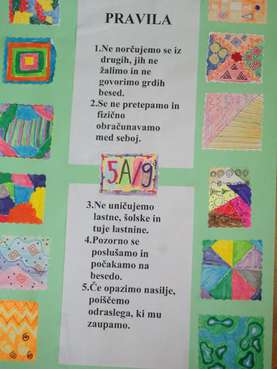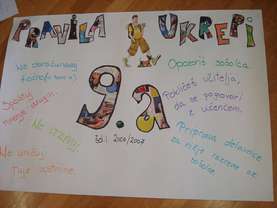Seven elementary schools already participating in UNICEF project <i>SPEAK UP! Let's Talk about Violence among Children</i> this school year
The project SPEAK UP! Let’s Talk about Violence among Children is in full swing. This school year it is being held for the second year at three elementary schools and for the first year at four elementary schools which have newly joined the program. The numerous activities within the project have been ongoing since August 2007, since the work was begun with teachers and then continued with children and parents. The project receives professional guidance and coordination from UNICEF Slovenia in cooperation with the Zaletalnica Society, which carries out the activities at the schools, while Lek Pharmaceuticals is a partner to the project, and among other things has earmarked funds for carrying out the project at the Lower Šiška Elementary School.
Several activities have already been carried out this year at the three “old” elementary schools – Prežihov Voranc in Maribor, Kette and Murn in Ljubljana and Šentvid in Ljubljana. The Zaletalnica Society has checked with the school staff about the functioning of sensitivity to peer violence, establishing rules and consequences, effectiveness and mediation, and the functioning of the protection network. “We have talked with the teachers about various current problems and looked for solutions. We assisted in the formation of peer groups – these are groups of students who with the assistance of the school’s professional staff develop ideas about helping and cooperating with their peers who find themselves in the role of victim, so that they can go to adults for help. These students meet regularly and talk, and the teachers develop workshops with them in order to develop specific skills and abilities for assisting their peers,” explains Samo Lesar of the Zaletalnica Society.
At the elementary schools where the project is being carried out for the first time, the project implementation system first had to be established. Coordination committees were formed at the Milojka Štrukelj and Fran Erjavec elementary schools in Nova Gorica and the Lower Šiška and Koseze elementary schools in Ljubljana which will coordinate the project at the schools.
The workshops focused on increasing the sensitivity of school staff to peer violence, and the teachers held a short workshop on peer violence for the parents where they presented the project to them. “The teachers and students set up classroom rules, and together with the teachers we evaluated the rules and suggested changes. We also prepared school staff for potential intervention upon the appearance of peer violence, and analyzed it and tried to improve it using role playing. We drew up, passed out and analyzed questionnaires on peer violence for staff and students and presented the results at a talk show for the students. At some schools we trained the teachers to hold parent meetings, where they talked about parenting styles,” says Samo Lesar.
The effects of the first year of carrying out the project over the past school year are encouraging, as they indicate that teachers are more attentive to the appearance of peer violence at school, and in individual cases take action more frequently and more effectively. The students are also finding that the teachers are noticing and preventing peer violence more often. If they see or participate in a case of peer violence, more than two thirds of students would talk to an adult about it. It is significant that many more students at these elementary schools are now prepared to help their peers and prevent peer violence through intervention. UNICEF Slovenia has issued two manuals as part of the project, one for parents and one for students, which due to their usefulness were very well received among students, teachers and parents. The latter were also enthusiastic about the workshops on parenting styles, which were designed for them as part of the project. All of these were encouraging achievements for expanding the project to other elementary schools, which are already contacting UNICEF and want to participate.
The project is being carried out with substantial support from the Ministry of Education and Sport, the Ministry of Labour, Family and Social Affairs, the National Education Institute and the City Municipality of Nova Gorica.
About the project
In order to draw attention to the problem of peer violence in schools, in 2006 UNICEF Slovenia began carrying out the advocacy project SPEAK UP! Let’s Talk about Violence among Children. Violence among peers is a serious problem which we must not ignore. Therefore the project is focused on providing information to children and parents about what violence is, that violence is unacceptable in any form and about how to prevent and deal with violence. The main emphasis is on cooperation among students, parents, school staff and local communities. In Slovenia the project is guided and coordinated by UNICEF Slovenia in cooperation with the Zaletalnica Society, which also carries out the activities at the schools, and Lek Pharmaceuticals is a partner to the project. During the 2006/07 school year the project was initially carried out at three elementary schools: Šentvid, Kette and Murn in Ljubljana and Prežihov Voranc in Maribor. During the 2007/08 school year the project was joined by the Lower Šiška and Koseze elementary schools in Ljubljana and the Fran Erjavec and Milojka Štrukelj elementary schools in Nova Gorica.
Additional media information:
Maša Simič, Head of Public Relations
UNICEF Slovenia
masa.simic@unicef.si
Katarina Klemenc Dinjaški, Corporate Communications
Lek Pharmaceuticals
komuniciranje.lek@sandoz.com
Lek, a Sandoz company, is one of the pillars of leading world generics company Sandoz. It operates as a global development center for products and technologies, as a global manufacturing center for active pharmaceutical ingredients and medicines, as a competence center for the development of vertically integrated products, as a Sandoz competence center in the field of development and manufacturing of biosimilar products and as a supply center for the markets of CEE, SEE and CIS, sales Slovenia and sales services for Sandoz’s global markets. Lek d.d. employs more than 3,000 people. For further information please consult http://www.lek.si.
Novartis AG provides healthcare solutions that address the evolving needs of patients and societies. Focused solely on growth areas in healthcare, Novartis offers a diversified portfolio to best meet these needs: innovative medicines, cost-saving generic pharmaceuticals, preventive vaccines and diagnostic tools, and consumer health products. Novartis is the only company with leading positions in these areas. In 2007, the Group’s continuing operations (excluding divestments in 2007) achieved net sales of USD 38.1 billion and net income of USD 6.5 billion. Approximately USD 6.4 billion was invested in R&D activities throughout the Group. Headquartered in Basel, Switzerland, Novartis Group companies employ approximately 98,200 full-time associates and operate in over 140 countries around the world. For more information, please visit http://www.novartis.com.
This press release contains statements and conclusions based on projections of Lek’s future business operations. These estimates are derived from the best information currently available. In case these forecasts prove unreliable, the actual results could prove different from those projected.
For further information contact:
Katarina Klemenc Dinjaški
Corporate Communications
Lek Pharmaceuticals d.d.
Phone: + 386 1 580 22 43
Fax: + 386 1 580 24 32
communications.lek@sandoz.com


